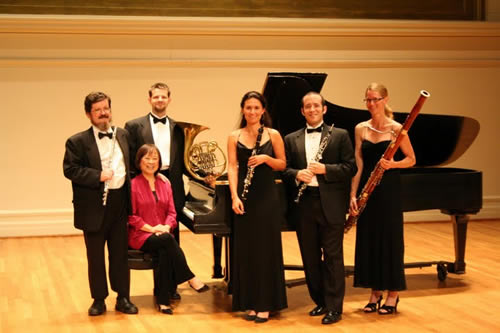University of Virginia Chamber Music Series
- Sunday, November 1, 2009
- Old Cabell Hall
- 3:30pm
- $20 adults, $10 students, under 18 are free. UVA student’s tickets may reserve free tickets in advance, or purchase them at the door
OPENING THE 2009-2010 SEASON OF THE UNIVERSITY OF VIRGINIA CHAMBER MUSIC SERIES, the Albemarle Ensemble presents an evening depicting the courage of four composers whose nationalistic pride inspired them and whose struggles against political, ideological, and physical odds transformed music. Reflecting the change in day and time beginning this year, the performance will take place on Sunday, November 1 at 3:30pm in Old Cabell Hall on the University grounds.
During its 2009-2010 Season, the UVA Chamber Music Series will offer four concerts highlighting the talent, creativity and insight of the university’s performance faculty. The first chamber performance features the Albemarle Ensemble, which has been in residence since 1987. The ensemble will be joined by pianist Mimi Tung, distinguished member of the McIntire Department of Music at UVA.
With the theme of Note-able Revolutions, each of the four concerts of the series will examine a characteristic of revolution and change. The Albemarle Ensemble program highlights the courage composers summon to write music through turbulent historic times and personal tragedies.
As complex as his music, Beethoven composed during a turbulent time in Europe that saw Napoleon flourishing his military might and that brought Spain and France to war with England. By 1796 when his Piano Quintet Op. 16 in E Flat Major was composed, the American Revolution was inspiring the French. Revolution was coming of age and among its consequences was the loss of royal music patronage, a dramatic change for musicians. Forced to make a living through teaching, composing, performing and seeking patrons, Beethoven struggled with the suspicion that he was losing his hearing and the desire to become the new Mozart. While the Piano Quintet Op. 16 in E Flat Major resembles Mozart’s work in the same key and instrument, it portrays the revolutionary genius of Beethoven which challenged the Viennese audiences with its strange and extravagant harmonies, development, and emotional expression. No one will deny that it is Beethoven, not Mozart.
Those who are familiar with György Ligeti’s works in Stanley Kubrick’s 2001: A Space Odyssey, will be surprised by the lack of experimental compositional methods in Six Bagatelles for Wind Quintet (1953). Forced into the labor corps of Hungary after World War II, György Ligeti returned to his musical studies waiting to be free of the cultural edicts from Moscow. While privately perfecting his compositional style, Ligeti composed Six Bagatelles for Wind Quintet (1953), six short compositions employing Hungarian and Romanian folk tunes. Originally written for piano in 1951, transcribed for winds in 1953 and finally premiered in 1956, Six Bagatelles for Wind Quintet, as composed was banned by the Hungarian government because of its use of chromaticism which was dangerous to the sensibilities of the public. Ligeti responded: “I am in a prison. One wall is the avant-garde, the other is the past. I want to escape.” Ultimately, he was at liberty to express his own style but not before composing Six Bagatelles for Wind Quintet.
Although in the music forum rather than political arena, Astor Piazzolla was a revolutionary. He openly demonstrated courage when he braved the criticism of traditional tangueros to compose and perform tangos in a classical setting. Moving from the expected orchestra supporting dancers and singers, his innovative work transformed the classic tango into a chamber music piece. His interpretation of tango involving the combination of jazz and classical styles, as well as his performance in a classical setting of the bandoneón, garnered intense negativity from aficionados of the tango. By using his popularity as a musician, he incorporated his experimental style in performances to develop a nationalistic pride which enraptured Western audiences.
To accept change or to stay in the past became the question which August Klughardt was to face. Composing at a point when Strauss and Schöenberg were revolutionizing harmonic language, Klughardt chose to express his own musical voice. While he enthusiastically embraced "Neudeutsche Schule," he remained stalwart in refusing to reject genre from the past, composing symphonies, chamber music and overtures. Wind Quintet Op. 79 in C Major is a nostalgic look back at the pleasant expressions of a single tune.
This concert takes place on Sunday, November 1, 2009, at 3:30pm in Old Cabell Hall of the University of Virginia. Tickets are $20 for adults, $10 students with IDs at the door, and those under 18 are free. UVA student’s tickets may reserve free tickets in advance. A reception follows.
To purchase tickets online visit www.artsboxoffice.virginia.edu or call the Arts Box Office at (434) 924-3376.
EVENT DETAILS
Who: University of Virginia Chamber Music Series
What: Albemarle Ensemble
Program:
György Ligeti’s: Six Bagatelles(1953)
Astor Piazolla: Tangos
August (Fredrich Martin) Klughardt: Wind Quintet Op. 79 in C Major
Ludwig van Beethoven: Piano Quintet Op. 16 in E Flat Major
When: Sunday, November 1, 2009, 3:30pm at Old Cabell Hall, UVA

